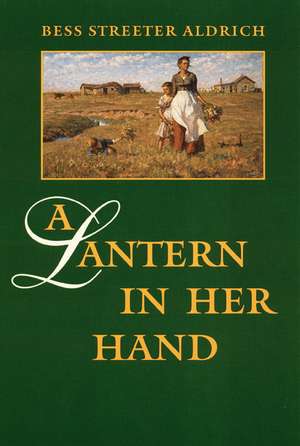A Lantern in Her Hand
Autor Bess Streeter Aldrichen Limba Engleză Paperback – 13 apr 2023
First published in 1928, A Lantern in Her Hand has outlasted literary fashions to touch generations of readers. In this classic story of a pioneer woman, Bess Streeter Aldrich modeled protagonist Abbie Deal on her own mother, who in 1854 had traveled by covered wagon to the Midwest.
In A Lantern in Her Hand, Abbie accompanies her family to the soon-to-be-state of Nebraska. There, in 1865, she marries and settles into her own sod house. The novel describes Abbie's years of child-raising, of making a frontier home able to withstand every adversity. A Disciplined writer knowledgeable about true stories of pioneer days in Nebraska, Bess Streeter Aldrich conveys the strength of everyday things, the surprise of familiar faces, and the look of the unspoiled landscape during different seasons. Refusing to be broken by hard experience, Abbie sets a joyful example for her family—and for her readers.
Preț: 87.18 lei
Nou
Puncte Express: 131
Preț estimativ în valută:
16.68€ • 17.35$ • 13.77£
16.68€ • 17.35$ • 13.77£
Carte disponibilă
Livrare economică 24 martie-07 aprilie
Preluare comenzi: 021 569.72.76
Specificații
ISBN-13: 9780803259225
ISBN-10: 0803259220
Pagini: 307
Ilustrații: black & white illustrations
Dimensiuni: 140 x 216 x 25 mm
Greutate: 0.36 kg
Editura: Nebraska Paperback
Colecția University of Nebraska Press
Locul publicării:United States
ISBN-10: 0803259220
Pagini: 307
Ilustrații: black & white illustrations
Dimensiuni: 140 x 216 x 25 mm
Greutate: 0.36 kg
Editura: Nebraska Paperback
Colecția University of Nebraska Press
Locul publicării:United States
Notă biografică
This Bison Books edition includes Bess Streeter Aldrich's own story of how she came to write A Lantern in Her Hand. Among the other Aldrich books reprinted by the University of Nebraska Press is A White Bird Flying (first published in 1931), the sequel to A Lantern in Her Hand.
Recenzii
“Piercingly beautiful. . . . Aldrich’s pioneer woman was based on her mother, and the integrity of her depiction of life in a sod house in the late nineteeth-century Nebraska speaks to her readers. . . . In her own introduction Aldrich writes of wanting to tell her mother’s story after her mother’s death: ‘Other writers had depicted the Midwest’s early days, but so often they had pictured their women as gaunt, browbeaten creatures, despairing women whom life seemed to defeat. That was not my mother. Not with her courage, her humor, her nature that would cause her to say at the end of her life: ‘We had the best time in the world.’”—Allyson F. McGill, Belles Lettres
“The language is good and sturdy and dotted with imaginative metaphors and similes (‘Silence, so deep, that it roared in its vast vacuum’). If the book tries to crowd too much life into 300 pages, well, there was a lot of life: ‘We old pioneers,’ Abbie says at the end, ‘we dreamed dreams into the country.’”—Roger Miller, Milwaukee Journal
